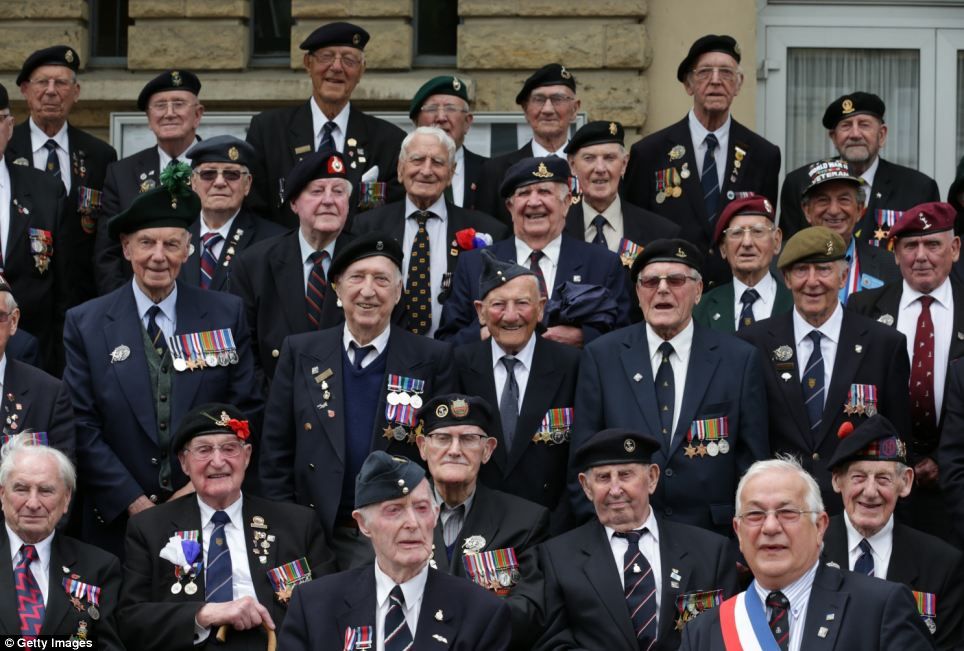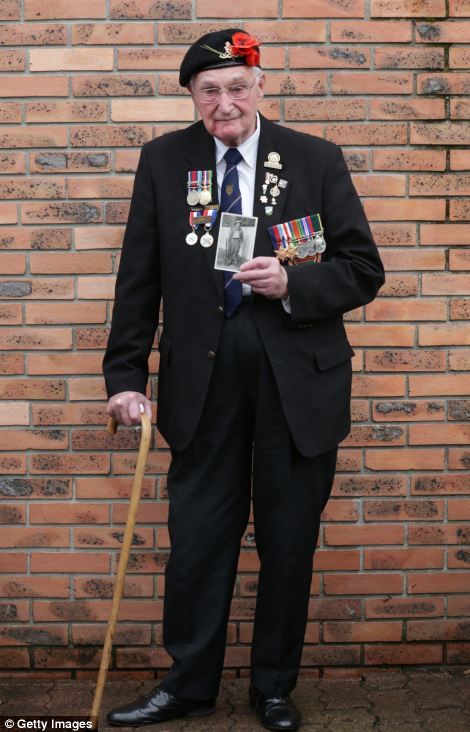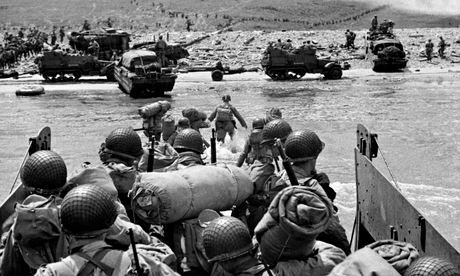 A group of veterans gather for a photograph at a function in Thury-Harcourt near Caen. They stood to attention as straight as their creaking backs would allow and saluted briskly as a lone bugler high up on the old Pegasus Bridge played the Last Post. A minute's silence followed; the men bowed their heads, dabbed their eyes and remembered the fallen, theguardian.com reports.
A group of veterans gather for a photograph at a function in Thury-Harcourt near Caen. They stood to attention as straight as their creaking backs would allow and saluted briskly as a lone bugler high up on the old Pegasus Bridge played the Last Post. A minute's silence followed; the men bowed their heads, dabbed their eyes and remembered the fallen, theguardian.com reports.
Some made one last heroic effort to rise from their wheelchairs, others leaned on sticks or the arms of relatives and friends. Medals glinted in the morning sunshine; rows and rows of them, pinned to still-proud chests.
It may be 70 years on, but the camaraderie remains strong. The old soldiers addressed each other as "brother" and with a valiant slap on the back, as if seven decades had not passed. There were shared nods of recognition between veterans in black and wine-coloured berets, and serving military officers who share the common bond of conflict. Schoolchildren who were hearing about history first hand were hanging on every word.
"One of the reasons it's wonderful to be here is because everyone is interested in you," said Neville Foote, 94. "Back home, nobody is interested in us. We're just old people. I am sometimes asked to go to schools to talk, but the children don't know about the war and don't want to know."
 John Ainsworth, 93, who was in the Royal Artillery, brought a photograph of himself taken in 1940.Foote, from Tottington in Lancashire, has no shortage of stories to tell. He arrived in Normandy on D-day on Juno beach with the 51st Highland Division of the Scottish Horse Regiment and spent the rest of the war moving across Europe. He was with the Allied forces that relieved the Bergen-Belsen Nazi concentration camp in 1945.
John Ainsworth, 93, who was in the Royal Artillery, brought a photograph of himself taken in 1940.Foote, from Tottington in Lancashire, has no shortage of stories to tell. He arrived in Normandy on D-day on Juno beach with the 51st Highland Division of the Scottish Horse Regiment and spent the rest of the war moving across Europe. He was with the Allied forces that relieved the Bergen-Belsen Nazi concentration camp in 1945.
Foote was just 23 when he jumped off the landing craft along with Canadian troops from the North Nova Scotia Highlanders and ran on to the French beach "at tea time … don't ask when that was because we didn't know what day it was let alone the time," he says.
"I remember every detail of the landing even now. It was a terrifying experience," he adds. "We just kept moving. It was the same after D-day, we kept moving across Europe fighting all the way."
At one point crossing the Rhine, the troop carrier Foote was in hit a mine, killing the man sitting next to him. The survivors had to scoop up the dead man's remains and carry on. It is hardly surprising that for many decades, the men who returned from D-day and the battle to liberate France, did not talk about their experiences.
"So many were lost. I'm fine about coming back, but certain parts are hard. When you go to the graves and see your mates, just 22 or 23 who never made it, you just feel it here," as he taps his chest, his eyes fill with tears.
"Still, I like to think I made up for them in life."
The taking of the bridge in the village of Bénouville, and a second bridge in nearby Ranville, was the first operation of D-day. Troops of the 6th Airborne Parachute Regiment, led by Major John Howard of the Ox and Bucks Light Infantry, landed at 00.16am in six Horsa gliders and neutralised the two bridges held by German forces in ten minutes, with the loss of only two lives.
Operation Deadstick, as it was known, was the start of the Longest Day. Howard, who died in 1999 aged 86, was later played by actor Richard Todd – himself a D-day parachute veteran – in the Hollywood film of the Allied landings. Howard received a Distinguished Service Order and a Croix de Guerre.
On Thursday, Howard's daughter Penny Bates laid a wreath at Bénouville, where plaques, monuments, a large sculpture the Avenue de Major Howard, are testimony to the heroism of him and his men.
"I'm here to remember my father and his men and I'm very proud to pay my respects. I have come back here many, many times and it is always an honour and always very emotional and moving. Of course to me he was a hero, but then he was my father."
 American troops in landing craft go ashore in Normandy on D-day, 6 June, 1944. Photograph: Hulton-Deutsch Collection/CorbisJoan Woods, whose husband Lt Corp Tom Packwood was in the same glider as Howard, buried her husband's ashes near Pegasus Bridge after he died eight years ago. "Whenever we travelled on the continent, he always insisted on coming here to pay tribute to friends buried there. He never talked about what happened until the 40th anniversary when he met other veterans here. Only then did he tell me what happened.
American troops in landing craft go ashore in Normandy on D-day, 6 June, 1944. Photograph: Hulton-Deutsch Collection/CorbisJoan Woods, whose husband Lt Corp Tom Packwood was in the same glider as Howard, buried her husband's ashes near Pegasus Bridge after he died eight years ago. "Whenever we travelled on the continent, he always insisted on coming here to pay tribute to friends buried there. He never talked about what happened until the 40th anniversary when he met other veterans here. Only then did he tell me what happened.
"Of course, by then they all had different versions of what had happened because so many years had passed, so they couldn't agree."
She added: "Pegasus Bridge defined his life, but like many of the men, my husband's attitude was that they were trained to do a job and they just got on and did it well."
After a renovated Centaur tank, found near Pegasus Bridge and one of only five remaining, was inaugurated, the Last Post, Reveille and the Canadian, British and French national anthems were played. Veterans cheered as a dozen second world war planes, including an old Lancaster bomber, flew past.
A group of 12-year-old French schoolchildren from nearby Troarn – which was heavily bombed by the Allies and liberated more than two months after D-day – wore red T-shirts saying: "I am a Child of Freedom. Merci Dear Veteran."
The youngsters clustered around the old soldiers, listening to their stories and asking questions. Their teacher Jean-Pascal Auvray said: "We brought them here so they can be witnesses to this later. Today they are 12 years old, but when they have their own children and grandchildren, they will remember coming here and meeting the veterans. They will have a direct line with the history."
 В Атырау -10
В Атырау -10